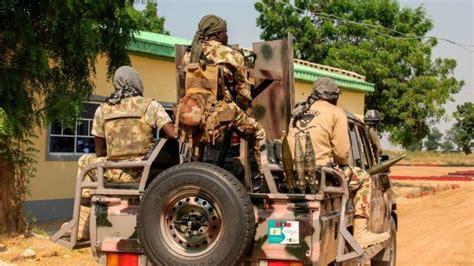
Nigeria’s inability to block terrorist financing, arms, recruitment fueling insecurity
Kabiru Adamu, MD/CEO, Beacon Security and Intelligence Limited, has issued a stern warning over Nigeria’s worsening insecurity, attributing the persistent wave of insurgent attacks to the country’s failure to dismantle terrorist funding channels, arms supply networks, and recruitment pipelines.
Speaking during an interview on ARISE News on Tuesday, Adamu highlighted a range of systemic failings both domestic and international that are contributing to the country’s fragile security architecture, particularly in the north-east and border regions.
According to him, the recent resurgence of attacks in Borno State and other parts of the country underscores the urgent need for a coordinated, inclusive national security strategy.
He pointed to the overstretched capacity of the military as one of the key domestic problems.
“A new theatre of war has opened up, Operation North-West, and the military is now stretched thin across the north-east, Niger Delta, north-central, and even Abuja. That divided attention has created operational gaps”, he said.
Adamu noted that insurgents have become more brazen in their operations, deliberately targeting hard military installations to assert their relevance and loot weapons for future attacks.
“We’ve not prevented their ability to generate funding, to acquire weapons and ammunition, to recruit, and to move freely whether on motorcycles or in vehicles,” he stated.
Despite the existence of comprehensive legal instruments such as the National Counterterrorism Strategy (NACTEST), the Policy Framework on Countering Violent Extremism (PCVE), and the Terrorism Prohibition and Prevention Law (2022), Adamu lamented that the government has largely failed to implement these frameworks meaningfully.
“We have attempted in parts of the north-east, but we’ve not rolled it out nationally,.
“NACTEST, introduced in 2016, was due for a five-year review that hasn’t happened. We need to assess what worked, what didn’t, and improve upon it”, he said.
He stressed that any effective counterterrorism strategy must include active participation from the public. However, this inclusion remains alarmingly absent.
“Go to any remote market in the country and ask a trader: if she saw a terror group leader, could she recognise them? Could she call security? The answer is no. Even in urban centres, that gap exists”, he said.
Adamu linked Nigeria’s growing insecurity to deteriorating conditions in neighbouring Sahel countries such as Niger, Mali, and Burkina Faso, where jihadist groups affiliated with global terrorist organisations like ISIS and Al-Qaeda are expanding their footprint.
“These groups are moving southwards towards the Atlantic coast to gain access to ports. We are already seeing increased attacks in Benin Republic and parts of Nigeria,” he warned.
The recent withdrawal of Nigerien troops from border regions, a move prompted by the military government’s focus on protecting its capital and oil infrastructure has created security vacuums that militants are now exploiting.
With over 1,600 kilometres of porous borders between Nigeria and its northern neighbours, Adamu said the lack of effective border control has only exacerbated the situation.
Adamu applauded President Bola Tinubu’s plan to establish a national forest guard initiative a campaign promise now coming to life but cautioned against a fragmented approach.
“It’s a commendable initiative, but we already have several forest security structures at federal, state, and even informal levels like the Hunters Association. Duplication is a real risk”, he added.
He urged the federal government to conduct an audit of existing outfits, including regional security networks like Amotekun, to determine whether the new forest guards would operate independently or integrate into current structures.
He also questioned the wisdom of arming the forest guards in an environment already flooded with small arms and light weapons.
“Right now, the threat actors in the forests have military-grade weapons. If we recruit forest guards, will they also carry such weapons? We must be cautious”, he warned.
Instead, he proposed a “take, hold, and rebuild” strategy where the military would clear terrorist-held forests, forest guards would then maintain control, and government would subsequently initiate development projects to prevent reoccupation by militants.
On the broader issue of governance, Adamu said the absence of synergy between federal and state governments is weakening Nigeria’s security response.
“At the moment, there’s no harmonised strategy. Some governors are negotiating with insurgents; others are refusing. That disharmony must be addressed”, Adamu said.
He welcomed Tinubu’s recent directive for greater collaboration between federal security agencies and state governors but warned that real progress would only be made through sustained and strategic coordination.
“We need coordination, cooperation, and collaboration. These are not just buzzwords. If we don’t harmonise and implement our security strategies effectively, we will continue to lose ground to insurgents and the consequences will be grave”, he said.
With insurgent groups continuing to evolve and draw strength from both local and international developments, Adamu mentioned that Nigeria must treat insecurity as the existential threat that it is and act accordingly.





